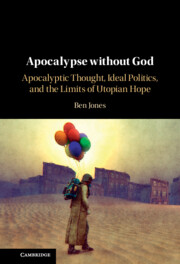Apocalypse, it seems, is everywhere. Preachers with vast followings proclaim that the world will soon end. Motivated by apocalyptic visions, terrorist groups carry out acts of unspeakable violence. Apocalyptic fears even grip the nonreligious faced with the dangers of climate change, deadly pandemics, and nuclear war. But as apocalyptic ideas pervade popular discourse, grasping their logic remains elusive. They increasingly have become disconnected from the religious traditions in which they arose, obscuring the hopes and anxieties that first gave birth to them.
Apocalypse without God argues that we can gain insight into apocalyptic thought by studying it through the eyes of secular thinkers. It starts with a puzzle: Why would secular thinkers find in Christian apocalyptic beliefs – often dismissed as bizarre – appealing tools for interpreting politics? To answer that question, it examines how three theorists with secular conceptions of politics – Machiavelli, Hobbes, and Engels – engage with Christian apocalyptic thought and how such thought still influences politics today. The apocalyptic tradition proves appealing, in part, because it theorizes a special relation between crisis and utopia. A persistent challenge in political philosophy is imagining a path from the imperfect present to the seemingly unattainable ideal society. To solve this challenge, apocalyptic thought points to crisis as the vehicle that creates new opportunities and brings the previously impossible within reach.
Though apocalyptic thought brings to mind doomsday visions, its appeal for political philosophy lies just as much in its visions of utopia. Apocalyptic thought offers apparent resources for navigating challenges that arise in ideal theory, which tries to imagine the best and most just society. By examining apocalyptic thought’s appeal and risks, this study ultimately arrives at new insights on the limits of ideal theory and utopian hope.

